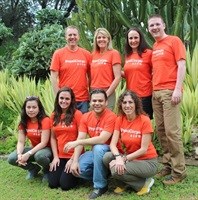Eight PepsiCo associates from around the globe, all participants in the company's PepsiCorps programme, have recently travelled to Limpopo to assist Heifer International South Africa on a sustainable farming project it is running in Limpopo.
This is to assist South African snack company Simba (a wholly owned subsidiary of PepsiCo), which has initiated various sustainable community farming projects over the past few years in order to uplift and invest in the communities in which it operates.
PepsiCorps is a skills-based volunteer programme that affords employees, from around the globe, an opportunity to make a positive impact by dedicating their knowledge, business skills and time to help local communities address societal change. The programme is a realisation of the company's 'performance with purpose' agenda allowing employees to gain perspective, insights and skills, which they can then bring back into the business, while using their current skills to improve the lives of disadvantaged communities.
Productive farming for child-headed households
The team working on the Blouberg project is made up of volunteers with different cultural and business backgrounds from US, UK, Mexico and Saudi Arabia. The Blouberg Project is based about 70km from Polokwane in an area affected by high rates of unemployment and an increasing number of child-headed households due to HIV/AIDS-related deaths.
The 4-week project will provide the remaining community, consisting predominantly of women and children, with the training, skills and resources necessary to become more productive and keep livestock.
The goal is to provide the community with the means and knowledge to provide an ongoing income and improve their living conditions. Key to the Heifer project is the concept of 'passing on the gift', which allows participants, once established, to pass on the equivalent of livestock, seeds and training to ensure the continuity and growth of the programme.
The team will work with the community to conduct value chain analyses and business development plans for the local Farmers Business Association, the Community Animal Health Workers Association (who take care of all the livestock in the community) and the Youth Honey Business (a new project designed to provide an income from bee keeping and honey production). It will also be involved in supporting the role of the women and girls in the community by mentoring young girls from the local school.
"The contribution that the team will make to the Blouberg project, passing on their knowledge and experience, are key to the current projects that the company is involved with in Limpopo and other parts of the country. It is especially relevant in that it also focuses on the most marginalised in these communities, the women and children," says Arnold Selokane, CSR manager at Simba.
University alignment
To date, the company has invested in projects in Limpopo, Mpumalanga and KwaZulu-Natal, partnering with the Limpopo Department of Agriculture and potato farmer Arthur Creighton (from Easy Green). Communities in these areas had vast farming land but lacked the knowledge and capital to harvest the land for commercial farming.
It has also increased the focus on community engagement projects by aligning with the University of Mpumalanga, previously Lowveld College of Agriculture. Fifteen learners have been enrolled and funded by Simba to do a three-year Diploma in Plant Production. Twenty-five students have been put through the programme since its inception in 2010. Once completed with their studies, these learners will be placed at the community farms to conduct their experiential training and in so doing imparting knowledge and skills for the betterment of their communities.
"These projects will improve the quality and reduce the risks of potato production by improving the knowledge base of potato farmers. The company believes it makes good business sense to invest in and uplift the communities where we do business and we believe other organisations can leverage the project and make it grow," concludes Selokane.
Follow the 2014 PepsiCorps team's journey in South Africa on Facebook and Twitter via #PepsiCorps.



























































